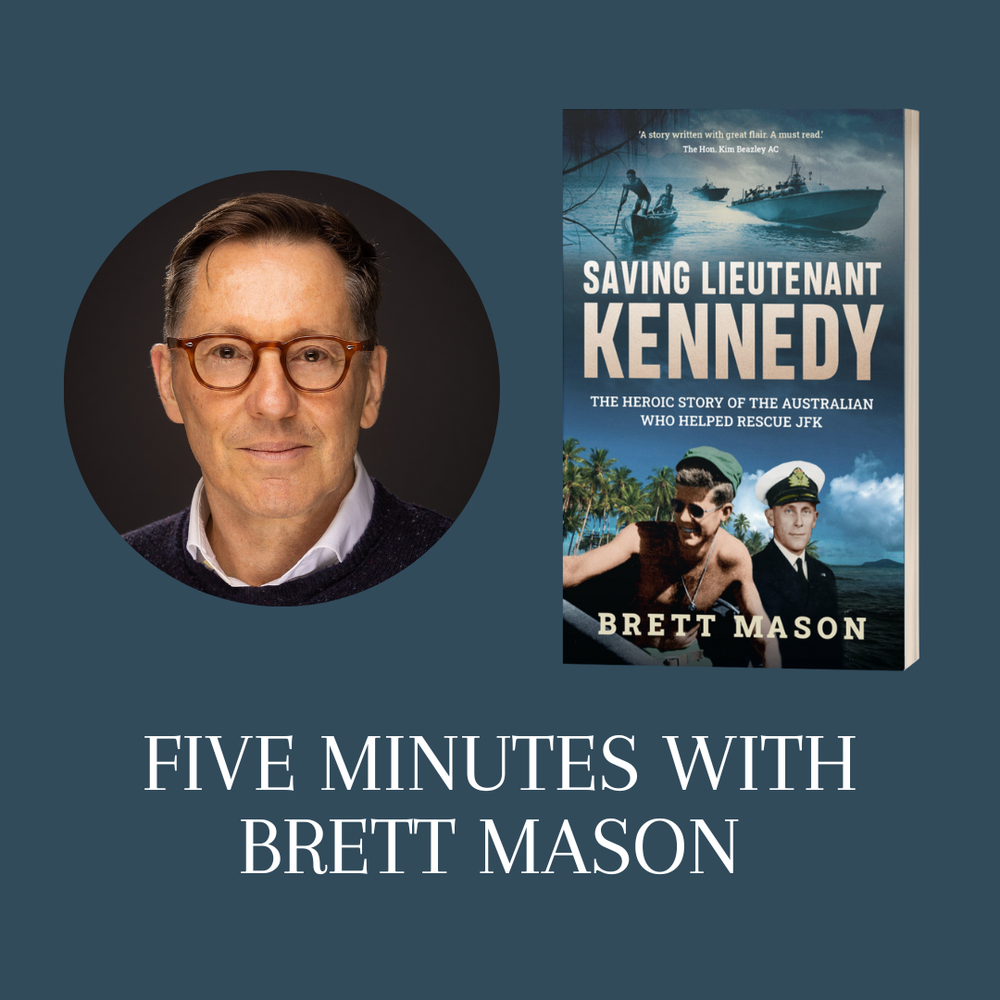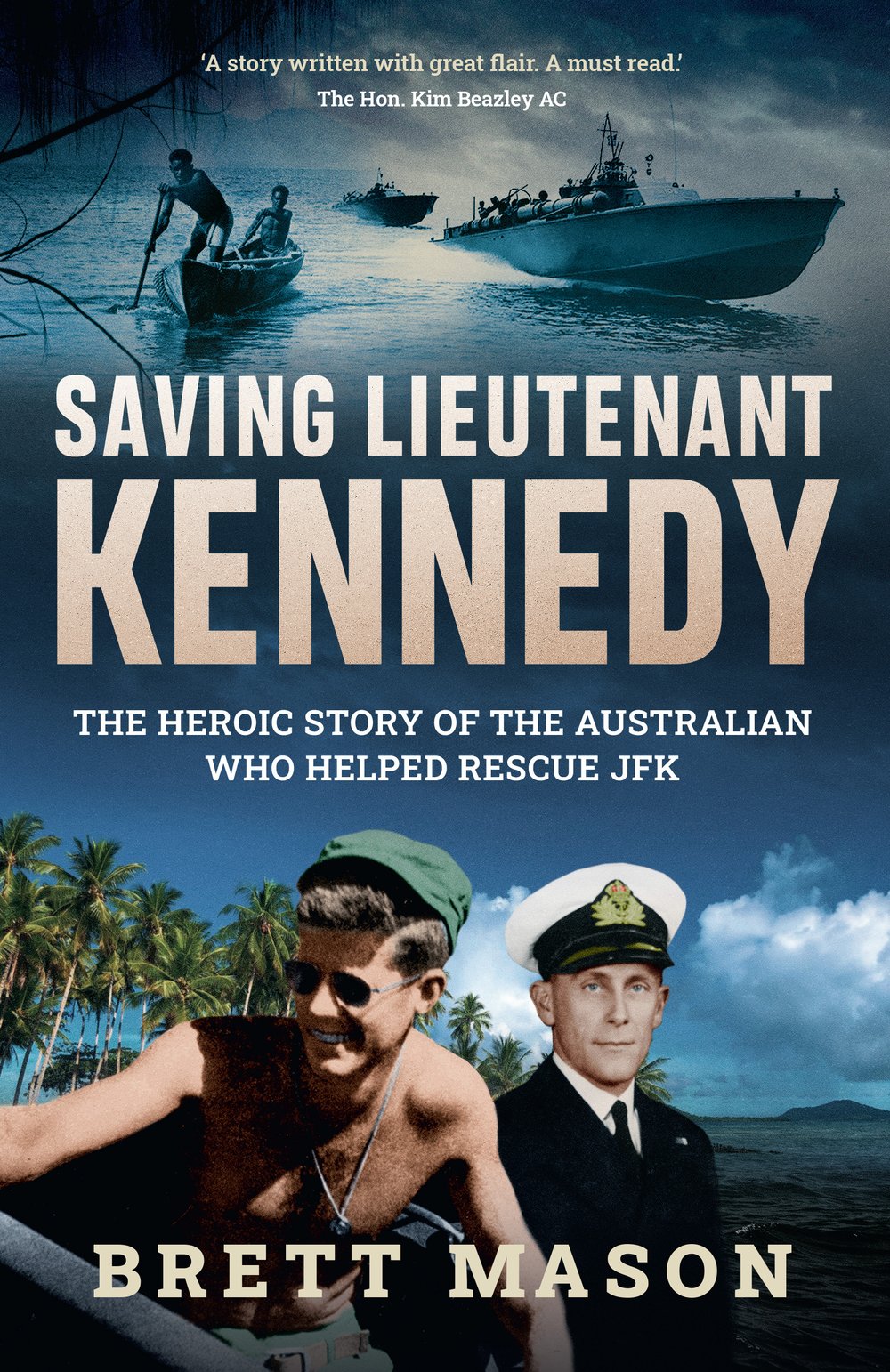Brett Mason is the author of Saving Lieutenant Kennedy: The heroic story of the Australian who helped rescue JFK, available in stores now. It tells the incredible story of an Australian coast watcher, Reg Evans, who during fighting in Solomon Islands in the Second World War helped save the life of a future American president, John F Kennedy, and how that and other wartime encounters between Australians and Americans have continued to shape the relationship between our two countries. We sat down with Brett to talk about the inspiration behind the book.
Why did you want to write this story?
No one will believe that I have been thinking about the story of Reg Evans and JFK for years. It is such a great story, very well known in America, but it has never been fully told from the Australian point of view – or indeed that of the Solomon Islander scouts who helped in the rescue. But I was finally moved to action by the arrival of Ambassador Caroline Kennedy and her public re-telling of the story of the rescue of her father, Lt John F Kennedy, and the crew of PT-109. With the 80th anniversary of Lt Kennedy’s rescue in August 1943, it seemed like a good time to write it.
Also, on a broader level, history has been staring me in the face. As I look out my front window, I can see that part of the Brisbane River where Allied submarines docked for refuelling and repair during the Second World War. Just a kilometre downstream is where ships of the US Navy’s Pensacola convoy berthed just two weeks after the bombing of Pearl Harbor in December 1941. With General MacArthur making his HQ in the AMP building in the CBD in July 1942, Brisbane was a garrison town at the centre of the Allied struggle in the Pacific War. This was perhaps the most dramatic time in Australia’s history, and also the beginning of the Australia-US alliance, which remains vital to this day.
In the book, you make the point that the war in the Pacific was the first time Australians and Americans were really thrown together in large numbers and got to know each other and that’s had a lasting effect on our cultural and political relationship. Have you always been interested in America and its relationship with Australia?
My late father first showed me the Americans. I remember the excitement of President Johnson visiting Canberra in October 1966. It was a big deal in those days; LBJ was the first sitting US President to visit Australia. For a few years in the 1970s my father worked at the US Embassy in Canberra. I well recall meeting the two US Ambassadors of that time. They were the most charming men I had ever met. Come to think of it, most Americans were.
Was there a highlight moment or discovery in researching this new book?
Both. The highlight moment was meeting Jim Burrowes, the last surviving coast watcher from the Second World War. I spent more than an hour with him and his wife Beryl. He was sharp, witty, and engaging at 99 years of age. What struck me was his optimism and gratitude. He told me he never worried about dying or losing the war. He reckons Australians are the luckiest people on the planet. An inspiration.
The discovery was of a more personal nature, namely of a family connection to the coast watchers. My mother’s uncle, Lieutenant Frank Barrett DCM, initially served with the 2nd AIF at Tobruk and then Greece, was taken prisoner, escaped enroute to a POW camp in Austria, and trekked all the way down to Palestine to rejoin his unit. He then returned to Australia, joined M Special Unit, and was killed in action at New Britain in late 1943. His name appears as one of the Fallen Coast Watchers on the Coast Watchers Memorial Lighthouse at Madang in Papua New Guinea. He was 32.
Lt Evans was a coast watcher. Can you briefly explain why coast watchers were so important in WWII?
Coast watchers were essentially intelligence officers observing and reporting enemy activity. As Reg Evans said, ‘A coast watcher’s work is … to sit in hiding like a spider, right in the web of the enemy, unseen and unheard. We became the eyes and ears of the Pacific’. They were all volunteers, drawn from people with knowledge of the islands and the local people and languages, incredibly courageous, working behind enemy lines, facing torture and execution as spies if captured. Before the era of satellites and surveillance drones, the coast watchers provided crucial intelligence about Japanese military movements and very often prewarned of incoming attacks, which enabled the Allies to prepare in time. Their contribution was widely recognised by the American and Australian top brass.
Brett Mason is Chair of the Council of the National Library of Australia, a member of the Council of Griffith University, and Adjunct Professor in the School of Justice at the Queensland University of Technology. He was formerly a Senator for Queensland, serving in the Ministry, before being appointed Australia’s Ambassador to The Hague and Permanent Representative to the Organisation for the Prohibition of Chemical Weapons. He is the author of Wizards of Oz: How Oliphant and Florey helped win the war and shape the modern world, published by NewSouth in 2022.

